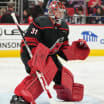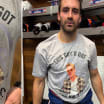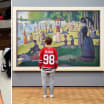Beliveau remembered as Canadiens icon five years after death
Hall of Famer remains conscience of hockey in Montreal, presence within organization
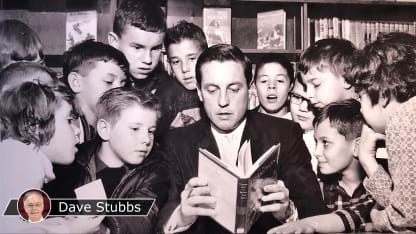
It is an inch and three-quarters in diameter, a popular novelty that was sold at the Montreal Forum and variety stores in Quebec. Beliveau is skating toward Montreal Canadiens photographer David Bier, upright, shoulders back, stickhandling toward the camera, the puck airbrushed out to make room for his name.
This was Beliveau's favorite in-uniform photo of himself among the thousands taken during his career. The image was used in black and white on the cover of a 1970 biography, "Strength Down Centre," and in color for his 1994 autobiography, "My Life in Hockey."
As it has been for every NHL game that I've covered the past 43 years, the button will be pinned on the inside left breast pocket of my suit jacket on Tuesday when the Canadiens celebrate the 110th anniversary of the team's birth on Dec. 4, 1909.
Beliveau died on Dec. 2 five years ago, following a lengthy illness. The legendary Hall of Famer's passing at age 83 broke the hearts of his family, his team, the NHL, friends, fans, acquaintances and people who had never seen him skate a single shift; all were touched by his quiet grace and the personal gestures, especially with and for children, that made him an icon who transcended hockey in his native Quebec and far beyond.
As Beliveau was for a generation of fans through the 1950s and '60s, he was "my guy" during my youth, captain of the Canadiens during the last decade of his career, the winner of 10 Stanley Cup championships. It was a pinch-me privilege to get to know him in later years, to spend time at his home, to chat in the Canadiens' alumni lounge, to phone him to talk for a story or for no reason at all.
This was a small measure of the man: I sat at his hospital bedside in 2012 as he slowly recovered from a stroke and practiced the famous signature he had penned thousands of times, his hand not yet steady.
"I will not sign an autograph unless it is in a way that people expect," he said, having answered by hand every piece of fan mail he received since signing with the Canadiens in 1953.
If the great
Maurice "Rocket" Richard
was viewed as the raging fire in the belly of great Canadiens teams of the 1940s and '50s, Beliveau was, and in many ways remains, the conscience of the franchise. A legend in skates from 1953-71 and a team vice president for seven more championships before retiring from the front office in 1993 after its most recent title, his presence is felt to this day within the organization.
Beliveau played 1,125 NHL games, every one for the Canadiens, finishing with 1,219 points (507 goals, 712 assists). He won the
Hart Trophy
as the League's most valuable player in 1955-56 and 1963-64, as well as the
Art Ross Trophy
in 1955-56 as the NHL's leading scorer. He was the inaugural recipient of the
Conn Smythe Trophy
in 1964-65 as the most valuable player of the Stanley Cup Playoffs. In 2009, the NHL presented him with its
Lifetime Achievement Award
; eight years later, he was voted to the
100 Greatest NHL Players
.
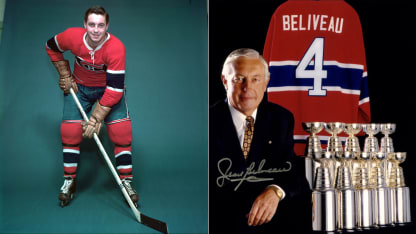
But "Le Gros Bill," as he was affectionately nicknamed, was about much more than hockey. I wrote dozens of stories about Beliveau, not so much about his career as his work in the community, from high-profile corporate events to his arriving unannounced at house-league hockey banquets to hand out awards -- leaving the kids delighted and their parents stunned speechless. Attending a Canadiens game 20 years ago last month with Beliveau and his wife, Elise, sitting with Montreal hockey's royal couple three rows behind the team bench, was an experience I'll never forget.
In 2014, I covered
Beliveau's illness and passing
; his two-day public visitation at Bell Centre, when tens of thousands came to pay their last respects; and his
funeral
, his coffin arriving and leaving historic Mary, Queen of the World Cathedral in a Montreal snowstorm. If I viewed having written Richard's funeral in 2000 as reporting history -- Beliveau served as a pallbearer, even as he was being treated for cancer -- covering the celebration of Beliveau's life was profoundly personal.
The funeral was as simple, graceful, modest and elegant as the man himself -- and it was the only time my Beliveau button has been worn in plain view, pinned on the outside of a winter overcoat.
The night before, the Canadiens had remembered their legend before their home game against the Vancouver Canucks with a scoreboard tribute and a deafening moment of silence. His aisle seat sat empty, its back upholstered by the team with a No. 4 jersey. I had stopped at the chair in mid-afternoon to reflect, and as I did, the arena unexpectedly went dark, a single spotlight beaming from the rafters down to his seat. I will always cherish the photo I took during those few seconds.
From Bell Centre's media gallery, over many years, I always knew it was time to play hockey when I'd look down and see the brilliant snow-white hair of Beliveau and his wife, their two guests between them. Their daughter Helene now sits in the aisle seat, with Elise in her usual place three seats in.
It was only in the last few years of his life that I told Beliveau about my breast-pocket button, pulling the jacket open to show him my vintage collectible. He laughed heartily, and when we later met before games, he'd sometimes playfully ask in his deep baritone, "David, are we sitting together tonight?" I'd open my jacket and tell him that yes, indeed we were.
As the Canadiens celebrate their 110th anniversary on Tuesday, five years and a day since Beliveau's passing, I will remember a wonderful man as we sit together again, a legend literally and figuratively against my heart.
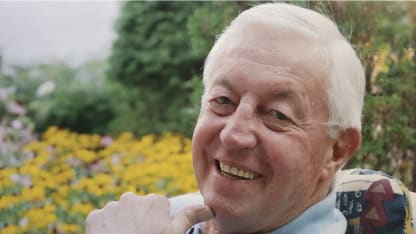
Photos: Jean Beliveau collection/Dave Stubbs/Hockey Hall of Fame/Montreal Canadiens/Helene Beliveau


